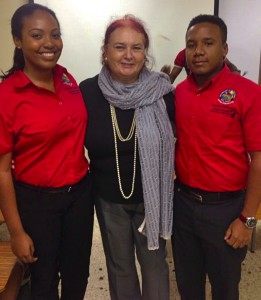
Down With Slacktivism! UWI Leads Seeks an Activist Voice
August 18th, 2015
A few days ago, I spoke to a group of University of the West Indies students about “Finding My Activist Voice Through Social Media: Activism vs. Slacktivism.” That last word was a new one for me, but I was honored to be invited to talk to such a bright group of young people, and it was an unusually delightful morning. The occasion was the UWI Leadership Program’s (UWI Leads) two-day Student Leadership Conference, preparing members for the upcoming academic year with plenty of food for thought and useful training and leadership skills. UWI Leads does not describe itself as a “club,” but an empowerment for students which creates partnerships with organizations such as National Integrity Action (NIA) and Respect Jamaica.
The students came straight from a presentation on climate change, so their heads were probably spinning. If there is one issue that one could generate huge amounts of activism around, it’s climate change. It is about time we stepped things up here in Jamaica, ahead of our first Climate Change March on October 24 (please save the date! More details to follow).
Now, I know young people spend endless hours playing around on social media. Thousands of cute photos and “selfies” are posted on Instagram and Facebook daily. There is much chat, jokes, teasing and flirting and even arguments. There is, of course, nothing wrong with leisure activities and “down time” on social media platforms; one wants to have fun, show off one’s latest outfit/boyfriend/slim figure/consumer item. However, if that is 100 per cent of your output, you are far from becoming an activist. I always think of the word “slack” as meaning “lazy” (although I know it has other Jamaican meanings) – so, to me “slacktivism” has an element of time-wasting. If you want to be considered a leader, aren’t there better ways of communicating, so that people will sit up and listen to what you have to say? Use your social media time wisely!
Having got that out of the way, how does one develop a profile of activism online, and actually put it into practice, out there in the “real world”? The first thing to do, I would suggest, is to define one’s goals; write a personal “mission statement.” What makes you “tick”? What is your passion? We all have at least one issue that resonates with us, and it could be something very specific: housing for the elderly, malnutrition among schoolchildren, marine pollution, organic agriculture, child sexual abuse – there is so much. Make sure that your online audience gets to know what guides you, what moves you.
Much of what we discussed during this session at UWI Leads’ conference was, indeed, as much about leadership as it was about social media – which, as has been said many times before, is merely a tool, albeit a powerful one. In other words, you must know yourself; and that is the firmest foundation you can build your activism on. An activist does not bend with the wind; he/she sticks to core principles and beliefs. In addition to sheer dogged determination and stubbornness, a great deal of patience is required. Activism is not short term work; and it must have strong roots, even if it takes a while to put them down.
I was asked this question in two or three different ways: How do you make that next step? At some point, I noted, you must step away from that laptop, put down the smartphone, and go out there. Get involved, on the ground. Yes, but how? I was asked. It seems to me sometimes that young people find themselves a little trapped in a virtual world; and perhaps on campus it is especially hard to break out of that internalized world. One feels comfortable online, able to express oneself confidently, even eloquently. But when it comes to taking that step “outside,” one can easily get cold feet. It is hard for a Jamaican (especially a youth with little life experience) to go out on a limb, alone. So I suggested joining a group (NIA, for example) whose aims coincide with one’s own; this will bring the much-needed confidence through learning, training, collaboration and so on. This will strengthen one’s activism.
Building a support group of like-minded people is crucial for young people. Participating in events that focus on the area of one’s activism; asking questions; networking; learning; researching – all these activities will help strengthen that foundation. These “outside” activities will, of course, also fuel one’s online strategies, amplify one’s voice, and hopefully gain one some valuable supporters. Those people will know that you are not just someone who tweets endlessly, without actually doing anything.
The other strategy is volunteerism. OK, young people have all heard that before – “Go out and volunteer, help somebody!” Sometimes it can sound quite dull – a chore, if you like. Why should one work for free? And yet, volunteering in a field that is of interest to you is an incredibly valuable experience that in an oblique kind of way also builds your leadership skills. You jump out of your comfort zone, very often, meeting people you would never otherwise cross paths with. Also, you learn. Learning is so important – and then, sharing what you have learned is equally so. That’s part of leadership.
As Jamaicans often like to say, when you are an activist – whether online or out in the community – “The race is not for the swift.” Don’t expect instant results. It is hard to say this to young people, who tend to look for instant gratification (and who doesn’t love that, when it happens). All that I can suggest is to look for the small victories. Make a note of any key support you have won, even if it’s a “retweet” from an influential public figure, or a new follower on your blog.
All the tools are laid out there, for you to make it work. Just pick and choose them carefully – and use them for good. No slacking!

Here I am with two representatives of the UWI Actuarial Society at the UWI Leads Student Leadership Conference on August 14. UWIAS dutifully “live tweeted” most of my presentation.
Tags: activism, Climate Change, leadership, National Integrity Action, Respect Jamaica, social media, Technology, University of the West Indies, UWI Actuarial Society, UWI Leads, volunteerism
The Gleaner reserves the right not to publish comments that may be deemed libelous, derogatory or indecent.
To respond to The Gleaner please use the feedback form.
4 Responses to “Down With Slacktivism! UWI Leads Seeks an Activist Voice”
- We Are the Zoomers
- Living Online with Humans and Birds: NAOC 2020
- Human Trafficking and the Problem of Public Education
- Down Memory Lane
- Are We Ready to Recover from COVID-19?
- Road Safety Matters: Is Your Vehicle Safe?
- Sexual Harassment, Me Too, and the Minister’s Disturbing Giggle
- The Vulnerable Senior Citizens, Private Care Homes and COVID-19
- A Muddle Over Masks
- Here is Something Life-Saving You Can Do: Give Blood!





It is rather unfortunate that Jamaicans learn to approach every human undertaking as a prospect for improving their social status and profile. Everything requires “training” these days.
In reading this column, it seems to me that these university students think that being labeled “activist” and “leader” makes them special, and that thesea titles should give them access to jobs and networks. The column is especially problematic because it treats “activism” like its some kind of career move. Nowhere in this column does it even address the various kinds of activists and activism that exist. And these students would certainly know that if they read a lot more!! In fact, that’s what they need to do – read, read widely, read deeply, about whatever issues they seem to care about. If they did that, they wouldn’t have to ask “what’s next?” They would know how to figure this out. You are not automatically knowledgeable just because you claim to be a student at UWI, or if you speak english better than others.
As for the leadership question: if there is anything that makes me doubt these students’ capacity for “leadership” is the fact that they are all wearing the same shirt. Really? Being a ‘leader’ requires you to wear a uniform so as to be identified as one of the pack? How are you in fact different from everyone else besides your declaration that you are? And so when you say you are a member of this group – what am I supposed to take from that? Is it to be self-evident from the red shirt that you are a thoughtful, engaging, knowledgeable, inquisitive and creative person? If you want to be a leader or an activist, don’t tell me or put on t-shirts. Do the work. Others will see you.
Thank you for your comments, Verna. I actually think that the words “activist” and “leader” do make people special. Nowhere in my presentation did I suggest that becoming an activist or leader was a great career move, and this is not in the column either. Talking about “goals” means personal goals, self-empowerment and so on – not career goals. In fact, I gave several examples of activism/activists in the presentation (in the online context – for example, the “Podemos” movement in Spain which has led to the birth of a political party, Arab Spring, environmental activism – Goat Islands, etc etc) but could not include all of that in a short column. I also told the students to do their research, tap into good information sources etc. So what you are telling me was included. Oh, and I cannot see anything wrong with wearing shirts. I pointed out that it is important for young people to have the support of like-minded people if they start on an activist path – most activists have always had that support, sharing of ideas and strategies. Even the Black Panthers all wore black. I also made it very clear that they do need to go out there and “do the work.” That was, actually, the whole point of my column. All the best, Emma
Wonderful article Emma! But as a young person I would say one of our biggest hurdles in making that move from the computer screen to the streets is getting support. And in Jamaica, for an issue to matter it needs some amount of physical support. What I realize these days, is that young people are very opinionated and use their social media very frequently to air their discontent about a particular issue. But they are also lazy, and trapped in this delusion that their rants on social media are enough to make an impact; instead of taking things to the streets. I suppose it also has to do with the kind of culture we have in Jamaica around demonstrating activism in the streets. Activism in Jamaica needs to move away from blocking road for the attention from a member of parliament, to standing up for real issues like corruption and abuse for eg. for young people to take the act of demonstrating more seriously.
Thanks for your comments, Germaine. I really only touched on one or two aspects of our great discussion. I agree with you that young people do need to work together, set up a network of activism if you like, in order to move forward. It’s not at all easy to step out on your own. I could not agree more; we need to stop the ranting (it’s easy to do that) and get out there and talk about the issues that are really impacting our society. And then go back and talk about it on social media, which should be a tool for development, knowledge and understanding!